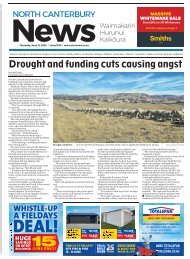Southern View: September 24, 2020
Create successful ePaper yourself
Turn your PDF publications into a flip-book with our unique Google optimized e-Paper software.
SOUTHERN VIEW Latest Canterbury news at starnews.co.nz<br />
Thursday <strong>September</strong> <strong>24</strong> <strong>2020</strong> 11<br />
News<br />
BIRDS OF THE ESTUARY<br />
Godwits return to<br />
estuary feeding spots<br />
• By Bea Gooding<br />
THE AVON-Heathcote Estuary<br />
has welcomed back the first<br />
of the godwits from Alaska,<br />
who have made the eight-day,<br />
11,000km journey back to their<br />
feeding spots.<br />
About 125 bar-tailed godwits<br />
have so far arrived from their<br />
breeding grounds from the other<br />
side of the world to enjoy the<br />
warmer months in Canterbury,<br />
and many more were to be expected<br />
over the next few weeks.<br />
The city council ornithologist<br />
Andrew Crossland said they arrived<br />
on <strong>September</strong> 14, the same<br />
date as the previous years of<br />
2015 and 2017, and was expecting<br />
between 1300 to 1500 more<br />
godwits arrivals by the end of<br />
November this year.<br />
During NZ’s winter, 306 godwits<br />
were counted on the city’s<br />
estuaries.<br />
“Some of these birds disappeared<br />
during August as they<br />
become restless and move about<br />
the country.”<br />
Tanya Jenkins is the manager of the Avon-Heathcote Estuary Ihutai Trust, a<br />
non-profit organisation formed in 2002 to protect one of New Zealand’s most<br />
important coastal wetlands. Each week she introduces a new bird found in<br />
the estuary. Her column aims to raise the understanding of the values and<br />
uniqueness of the area.<br />
Innovative gull dominates other birds<br />
NOT FUSSY: The wide-ranging<br />
appetite of black-backed gulls has<br />
led to a large increase in numbers<br />
since their arrival in New Zealand.<br />
PHOTO: ANDREW CROSSLAND<br />
WORDS LIKE innovative,<br />
adaptable, cunning and<br />
survivors spring to mind<br />
when talking about the<br />
black-backed gull or karoro<br />
– the largest and most<br />
common gull species in New<br />
Zealand.<br />
They are found anywhere<br />
across the country in<br />
non-forested areas, from<br />
coastlines to high country<br />
farming areas.<br />
Since European arrival,<br />
numbers of these large birds<br />
have exploded due to the<br />
fact that they quite like the<br />
introduction of farms and<br />
especially landfills where<br />
these not too fussy eaters<br />
have done extremely well.<br />
With an appetite for anything<br />
from newborn lambs,<br />
rabbits, eggs and chicks from<br />
other bird species, landfill waste,<br />
public rubbish bin contents and<br />
fishing offal from fishing boats,<br />
numbers have increased from<br />
a few thousand to an estimated<br />
half million plus, with some colonies<br />
reaching up to 1000 birds.<br />
Carrying the disease salmonella,<br />
their waste can actually<br />
‘pollute’ grassed areas which can<br />
be detrimental to farm animals<br />
and cause pollution in our waterways.<br />
In Christchurch with the<br />
closure of the Burwood<br />
Landfill in 2005 this bird<br />
has dispersed throughout<br />
the city where it manages<br />
quite well.<br />
In 2018, black-backed<br />
gulls managed to raid<br />
the chicks from every<br />
single nest of the critically<br />
endangered black-billed gull<br />
in Charlesworth Reserve and<br />
they have, understandably,<br />
not returned there since<br />
(and neither have other<br />
nesting birds such as the<br />
pied stilt).<br />
Due to the current risk<br />
of losing a number of other<br />
bird species in and around<br />
the estuary a black-backed<br />
gull management strategy<br />
is currently under review.<br />
Watch this space.<br />
How can we help prevent<br />
these birds from taking over the<br />
estuary? Please do not encourage<br />
these birds to stay here by<br />
making it just too easy for them<br />
by feeding bread or left-over fish<br />
and chips near the estuary.<br />
THE <strong>2020</strong> GENERAL ELECTION<br />
AND REFERENDUMS<br />
This year you can vote<br />
in two referendums.<br />
Enrol. Vote. Be heard.<br />
vote.nz<br />
referendums.govt.nz<br />
0800 36 76 56


















